小学英语改否定句练习
小学英语需要掌握的否定句变形,超详细讲解(附例句)
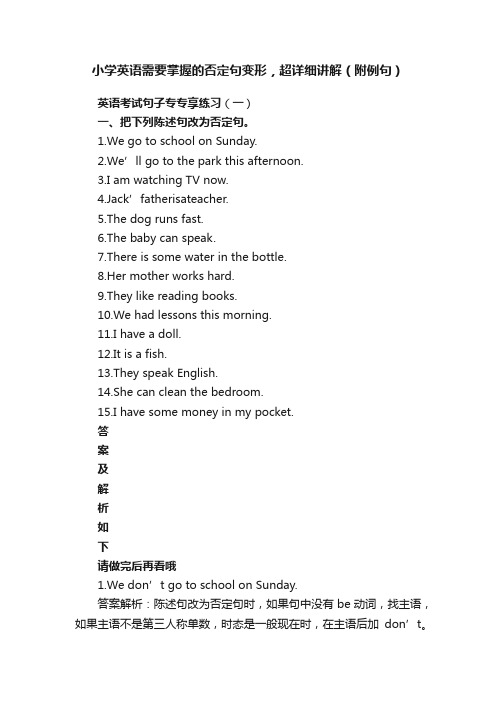
小学英语需要掌握的否定句变形,超详细讲解(附例句)英语考试句子专专享练习(一)一、把下列陈述句改为否定句。
1.We go to school on Sunday.2.We’ll go to the park this afternoon.3.I am watching TV now.4.Jack’fatherisateacher.5.The dog runs fast.6.The baby can speak.7.There is some water in the bottle.8.Her mother works hard.9.They like reading books.10.We had lessons this morning.11.I have a doll.12.It is a fish.13.They speak English.14.She can clean the bedroom.15.I have some money in my pocket.答案及解析如下请做完后再看哦1.We don’t go to school on Sunday.答案解析:陈述句改为否定句时,如果句中没有be动词,找主语,如果主语不是第三人称单数,时态是一般现在时,在主语后加don’t。
2.We won’t go to the park this afternoon.答案解析:陈述句改为否定句时,will的否定形式是won’t。
3.I am not watching TV now.答案解析:陈述句改为否定句时,当句中有be动词时,在be动词后not。
4.Jack’father isn’t a teacher.答案解析:陈述句改为否定句时,当句中有be动词时,在be动词后not。
5.The dog doesn’t run fast.答案解析:陈述句改为否定句时,如果句中没有be动词,找主语,如果主语是第三人称单数,时态是一般现在时,主语后加doesn’t。
小学英语肯定句变否定句和一般疑问句类型(含答案)
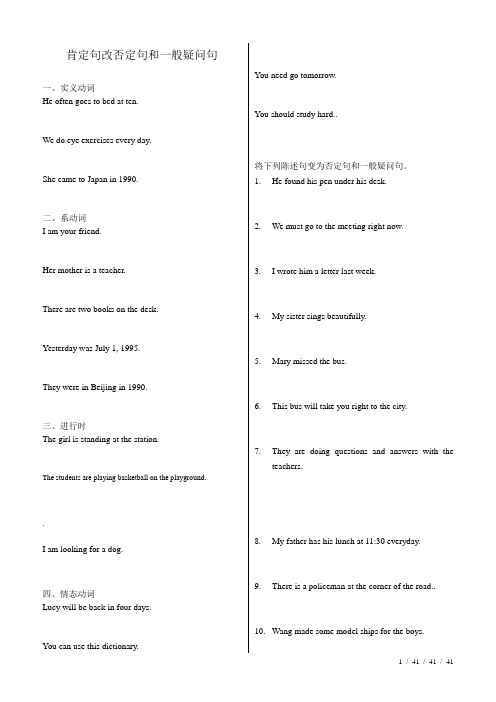
肯定句改否定句和一般疑问句一、实义动词He often goes to bed at ten.We do eye exercises every day.She came to Japan in 1990.二、系动词I am your friend.Her mother is a teacher.There are two books on the desk. Yesterday was July 1, 1995.They were in Beijing in 1990.三、进行时The girl is standing at the station.The students are playing basketball on the playground..I am looking for a dog.四、情态动词Lucy will be back in four days.You can use this dictionary. You need go tomorrow.You should study hard..将下列陈述句变为否定句和一般疑问句。
1.He found his pen under his desk.2.We must go to the meeting right now.3.I wrote him a letter last week.4.My sister sings beautifully.5.Mary missed the bus.6.This bus will take you right to the city.7.They are doing questions and answers with theteachers.8.My father has his lunch at 11:30 everyday.9.There is a policeman at the corner of the road..10.Wang made some model ships for the boys.11.I saw somebody in the room just now.12.There is some wonderful news in today’s paper.13.Xiao Li dropped the letter into the letter box.14.They are playing on the playground.15.Tom often tells them stories in French.16.After class some students play balls.17.Mary is reading newspaper now.18.I telephoned you yesterday.19.You have to go now.20.I have a house in the country.21.We did our homework together.22.They study for examination.23.We are talking about the film.24.I can go to the zoo today. 25.The first class begins at eight o’clock.26.It takes you three hours to go to Paris by air.27.I reviewed my lessons yesterday.28.I’ll go home by bus.29.He forgot to post the letter this morning.30.This room is going to be painted next week.肯定句变否定句和一般疑问句类型答案一、实义动词He often goes to bed at ten.→He does not often go to bed at ten.→Does he often go to bed at ten?We do eye exercises every day.→We don’t do eye exercises every day.→Do you do eye exercises every day?She came to Japan in 1990.→She did not come to Japan in 1990.→Did she come to Japan in 1990?二、系动词I am your friend.→I am not your friend.→Are you my friend?Her mother is a teacher.→Her mother is not a teacher→Is her mother a teacher?There are two books on the desk.→There are not two books on the desk→Are there two books on the desk?Yesterday was July 1, 1995.→Yesterday was not July 1, 1995.→Was yesterday July 1, 1995?They were in Beijing in 1990.→They were not in Beijing in 1990→Were they in Beijing in 1990?三、进行时The girl is standing at the station.→The girl is not standing at the station.→Is the girl standing at the station?The students are playing basketball on the playground.→The students are not playing basketball on the playground.→Are the students playing basketball on the playground?I am looking for a dog.→I am not looking for a dog.→Are you looking for a dog?He was writing letters at this time last night.→He was not writing letters at this time last night.→Was he writing letters at this time last night? We were having a meeting this time yesterday.→We were not having a meeting this time yesterday.→Were you having a meeting this time yesterday?四、情态动词Lucy will be back in four days.→Lucy will not be back in four days.→Will Lucy be back in four days?You can use this dictionary.→You can not use this dictionary.→Can I use this dictionary?You need go tomorrow.→You need not go tomorrow.→Need I go tomorrow?You should study hard.→You should not study hard..→should I study hard?将下列陈述句变为否定句和一般疑问句。
小学英语肯定句改为否定句(知识点+练习题)
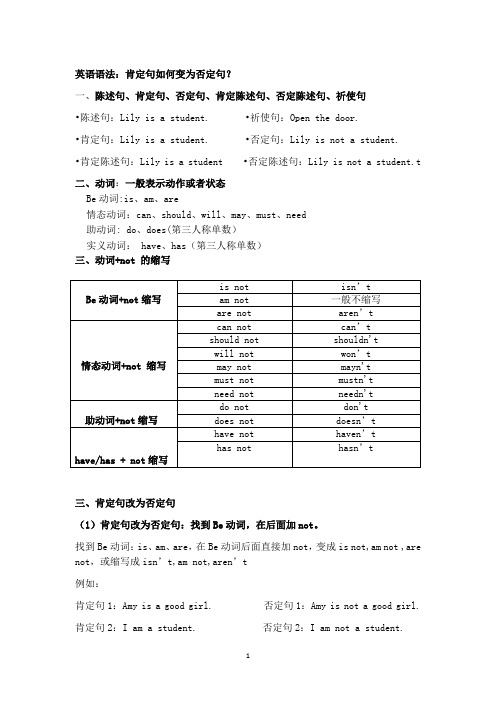
英语语法:肯定句如何变为否定句?一、陈述句、肯定句、否定句、肯定陈述句、否定陈述句、祈使句•陈述句:Lily is a student. •祈使句:Open the door.•肯定句:Lily is a student. •否定句:Lily is not a student. •肯定陈述句:Lily is a student •否定陈述句:Lily is not a student.t二、动词:一般表示动作或者状态Be动词:is、am、are情态动词:can、should、will、may、must、need助动词: do、does(第三人称单数)实义动词: have、has(第三人称单数)三、动词+not 的缩写三、肯定句改为否定句(1)肯定句改为否定句:找到Be动词,在后面加not。
找到Be动词:is、am、are,在Be动词后面直接加not,变成is not,am not ,are not,或缩写成isn’t,am not,aren’t例如:肯定句1:Amy is a good girl. 否定句1:Amy is not a good girl. 肯定句2:I am a student. 否定句2:I am not a student.肯定句3:These flowers are very beautiful.否定句3:These flowers are not very beautiful.(2)肯定句改为否定句:找到情态动词,在后面加not。
找到情态动词:can、should、will、may、must、need,在情态动词后面直接加not ,变成 can not, should not, will not,may not,must not,need not 或缩写成can’t ,shouldn't,won’t ,mayn't,mustn't,needn’t例如:肯定句1:I can speak English. 否定句1:I can not speak English.肯定句2:You should go now. 否定句2:You should not go now.肯定句3:I must do my homework. 否定句3:I must not do my homework.(3)肯定句改为否定句:在动词前面加 don't 或doesn't。
小学英语按要求改写句子
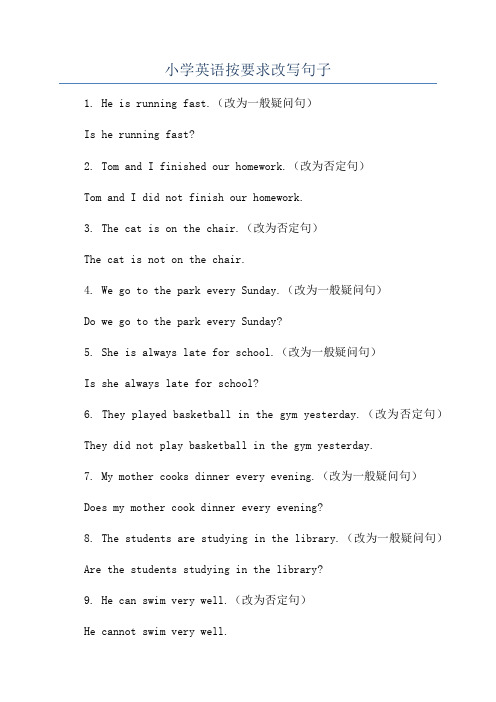
小学英语按要求改写句子1. He is running fast.(改为一般疑问句)Is he running fast?2. Tom and I finished our homework.(改为否定句)Tom and I did not finish our homework.3. The cat is on the chair.(改为否定句)The cat is not on the chair.4. We go to the park every Sunday.(改为一般疑问句)Do we go to the park every Sunday?5. She is always late for school.(改为一般疑问句)Is she always late for school?6. They played basketball in the gym yesterday.(改为否定句)They did not play basketball in the gym yesterday.7. My mother cooks dinner every evening.(改为一般疑问句)Does my mother cook dinner every evening?8. The students are studying in the library.(改为一般疑问句)Are the students studying in the library?9. He can swim very well.(改为否定句)He cannot swim very well.10. The cat is chasing the mouse.(改为一般疑问句)Is the cat chasing the mouse?。
小学英语否定句
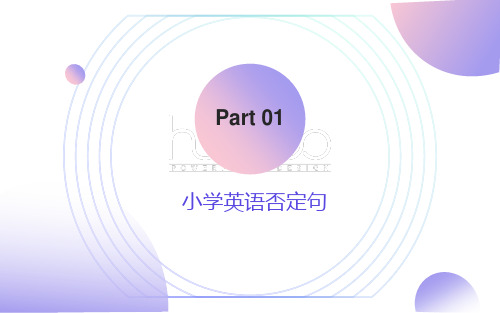
44.They are going to the cinema this evening. They aren’t / are not going to the cinema this evening.
11.Lingling can speak good English. Lingling can’t / can not speak good English.
12.The students can play football after school. The students can’t / can not play football after school.
40.Sarah can do Chinese Kung fu. Sarah can’t / can not do Chinese Kung fu.
41.My coat is pretty. My coat isn’t / is not pretty.
42.This is a good film. This isn’t / is not a good film.
25.Amy and I have some nice pictures. Amy and I don’t / do not have some nice pictures.
26.I like painting. I don’t / do not like painting.
27.I go to school on foot. I don’t / do not go to school on foot.
小学英语改否定句练习
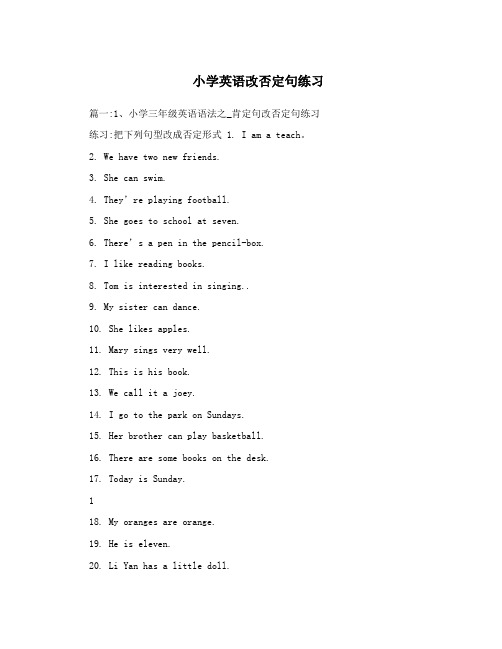
小学英语改否定句练习篇一:1、小学三年级英语语法之_肯定句改否定句练习练习:把下列句型改成否定形式 1. I am a teach。
2. We have two new friends.3. She can swim.4. They’re playing football.5. She goes to school at seven.6. There’s a pen in the pencil-box.7. I like reading books.8. Tom is interested in singing..9. My sister can dance.10. She likes apples.11. Mary sings very well.12. This is his book.13. We call it a joey.14. I go to the park on Sundays.15. Her brother can play basketball.16. There are some books on the desk.17. Today is Sunday.118. My oranges are orange.19. He is eleven.20. Li Yan has a little doll.篇二:小学英语句型转换之肯定句变否定句的相关习题小学英语句型转换之肯定句变否定句的相关习题写出下列句子的否定形式:1.Mike would like some chicken.?Mike______like ______ chicken.2.He often goes to bed at ten.?He often ______ _____ to bed at ten.3.Mary is a teacher,too.?Mary ______ a teacher ,_______.4.They went to Shanghai yesterday.?They _____ ______to Shanghai yesterday.5.He always goes shopping on the weekend.? He __________ shopping on the weekend.篇三:小学英语一般疑问句、否定句和特殊疑问(附习题)一、肯定句改否定句的方法——一步法1、在be动词后加not。
小学英语肯定句变否定句和一般疑问句类型(含答案)

肯定句改否定句和一般疑问句一、实义动词He often goes to bed at ten.We do eye exercises every day.She came to Japan in 1990.二、系动词I am your friend.Her mother is a teacher.There are two books on the desk.Yesterday was July 1, 1995.They were in Beijing in 1990.三、进行时The girl is standing at the station.The students are playing basketball on the playground..I am looking for a dog.四、情态动词Lucy will be back in four days.You can use this dictionary. You need go tomorrow.You should study hard..将下列陈述句变为否定句和一般疑问句。
1.He found his pen under his desk.2.We must go to the meeting right now.3.I wrote him a letter last week.4.My sister sings beautifully.5.Mary missed the bus.6.This bus will take you right to the city.7.They are doing questions and answers with theteachers.8.My father has his lunch at 11:30 everyday.9.There is a policeman at the corner of the road..10.Wang made some model ships for the boys.11.I saw somebody in the room just now.12.There is some wonderful news in today’s paper.13.Xiao Li dropped the letter into the letter box.14.They are playing on the playground.15.Tom often tells them stories in French.16.After class some students play balls.17.Mary is reading newspaper now.18.I telephoned you yesterday.19.You have to go now.20.I have a house in the country.21.We did our homework together.22.They study for examination.23.We are talking about the film.24.I can go to the zoo today. 25.The first class begins at eight o’clock.26.It takes you three hours to go to Paris by air.27.I reviewed my lessons yesterday.28.I’ll go home by bus.29.He forgot to post the letter this morning.30.This room is going to be painted next week.肯定句变否定句和一般疑问句类型答案一、实义动词He often goes to bed at ten.→He does not often go to bed at ten.→Does he often go to bed at ten?We do eye exercises every day.→We don’t do eye exercises every day.→Do you do eye exercises every day?She came to Japan in 1990.→She did not come to Japan in 1990.→Did she come to Japan in 1990?二、系动词I am your friend.→I am not your friend.→Are you my friend?Her mother is a teacher.→Her mother is not a teacher→Is her mother a teacher?There are two books on the desk.→There are not two books on the desk→Are there two books on the desk?Yesterday was July 1, 1995.→Yesterday was not July 1, 1995.→Was yesterday July 1, 1995?They were in Beijing in 1990.→They were not in Beijing in 1990→Were they in Beijing in 1990?三、进行时The girl is standing at the station.→The girl is not standing at the station.→Is the girl standing at the station?The students are playing basketball on the playground.→The students are not playing basketball on the playground.→Are the students playing basketball on the playground?I am looking for a dog.→I am not looking for a dog.→Are you looking for a dog?He was writing letters at this time last night.→He was not writing letters at this time last night.→Was he writing letters at this time last night? We were having a meeting this time yesterday.→We were not having a meeting this time yesterday.→Were you having a meeting this time yesterday?四、情态动词Lucy will be back in four days.→Lucy will not be back in four days.→Will Lucy be back in four days?You can use this dictionary.→You can not use this dictionary.→Can I use this dictionary?You need go tomorrow.→You need not go tomorrow.→Need I go tomorrow?You should study hard.→You should not study hard..→should I study hard?将下列陈述句变为否定句和一般疑问句。
(完整版)小学英语句型转换专项练习(最新整理)
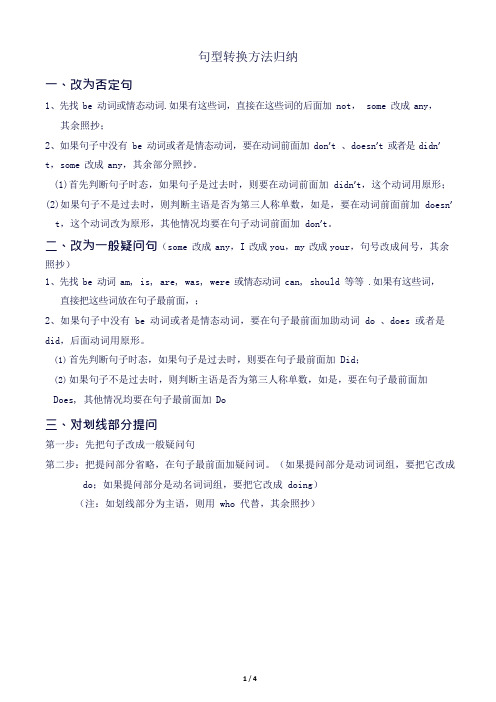
句型转换方法归纳一、改为否定句1、先找 be 动词或情态动词.如果有这些词,直接在这些词的后面加 not, some 改成 any,其余照抄;2、如果句子中没有 be 动词或者是情态动词,要在动词前面加 don’t 、doesn’t 或者是 didn’ t,some 改成 any,其余部分照抄。
(1)首先判断句子时态,如果句子是过去时,则要在动词前面加 didn’t,这个动词用原形;(2)如果句子不是过去时,则判断主语是否为第三人称单数,如是,要在动词前面前加 doesn’t,这个动词改为原形,其他情况均要在句子动词前面加 don’t。
二、改为一般疑问句(some 改成 any,I 改成you,my 改成your,句号改成问号,其余照抄)1、先找 be 动词 am, is, are, was, were 或情态动词 can, should 等等 .如果有这些词,直接把这些词放在句子最前面,;2、如果句子中没有 be 动词或者是情态动词,要在句子最前面加助动词 do 、does 或者是did,后面动词用原形。
(1)首先判断句子时态,如果句子是过去时,则要在句子最前面加 Did;(2)如果句子不是过去时,则判断主语是否为第三人称单数,如是,要在句子最前面加Does, 其他情况均要在句子最前面加 Do三、对划线部分提问第一步:先把句子改成一般疑问句第二步:把提问部分省略,在句子最前面加疑问词。
(如果提问部分是动词词组,要把它改成do;如果提问部分是动名词词组,要把它改成 doing)(注:如划线部分为主语,则用 who 代替,其余照抄)一,对下列句子中划线部分提问1,The deepest part(最深的部分)of the water is near Japan. 2,My father will take me to Beijing.3,My trip to Xi’an is great.4,Harry Potter Ⅳwill be on this afternoon.5,I’m looking for a dress.7,I saw many animals in Beijing Zoo.8,I often help my grandfather on the farm.9,I am from Australia.10,We will go to the nearest supermarket.11,My new pencil-box is about ten yuan.12,The name of the book is Sleeping Beauty.13,He came to visit China two days ago.14,There are twelve students over there.16,These sneakers are 280 yuan.17,I get up at 6 o’clock every morning.20,Tom saw many places of interest(名胜古迹)in that old city. 21,I came here by train.22,We are going to buy tomorrow’s air tickets.23,He’s making a model ship.24,My father works in Africa.25,Mike wants to be a singer(歌手) in the future.二,把下列句子变为一般疑问句:1.I am good at swimming.2.Mike is a student in Grade Six.3.Tom likes listening to the music4.Sarah can clean the classroom.6.H e came to visit China two days ago(两天前).7.I can speak English well.8.Tony had a picnic for a long time.9.They like making the cakes.10.Jim and Ben often help their grandfather on the farm after school.12.He wants to be an actor(演员)in the future(将来).13.We play basketball on Sundays.14.We should take care of(照看)the young trees.15.The girls are singing in the classroom.16.She has something to eat.17.Alice came to our home last week.18.The little boy is standing on the man's shoulders.19.There is some fruit juice in the glass.20.We will visit America next week(下一周).三,将下列句子变为否定句:1.He takes some pictures every day.4.Show me your library card, please.8.T here are a lot of lovely animals there.9.M y mother will take me to Beijing next Sunday.10.You can find many tall trees in the picture .“”“”At the end, Xiao Bian gives you a passage. Minand once said, "people who learn to learn are very happy people.". In every wonderful life, learning is an eternal theme. As a professional clerical and teaching position, I understand the importance of continuous learning, "life is diligent, nothing can be gained", only continuous learning can achieve better self. Only by constantly learning and mastering the latest relevant knowledge, can employees from all walks of life keep up with the pace of enterprise development and innovate to meet the needs of the market. This document is also edited by my studio professionals, there may be errors in the document, if there are errors, please correct, thank you!。
- 1、下载文档前请自行甄别文档内容的完整性,平台不提供额外的编辑、内容补充、找答案等附加服务。
- 2、"仅部分预览"的文档,不可在线预览部分如存在完整性等问题,可反馈申请退款(可完整预览的文档不适用该条件!)。
- 3、如文档侵犯您的权益,请联系客服反馈,我们会尽快为您处理(人工客服工作时间:9:00-18:30)。
小学英语改否定句练习篇一:1、小学三年级英语语法之_肯定句改否定句练习练习:把下列句型改成否定形式 1. I am a teach。
2. We have two new friends.3. She can swim.4. They’re playing football.5. She goes to school at seven.6. There’s a pen in the pencil-box.7. I like reading books.8. Tom is interested in singing..9. My sister can dance.10. She likes apples.11. Mary sings very well.12. This is his book.13. We call it a joey.14. I go to the park on Sundays.15. Her brother can play basketball.16. There are some books on the desk.17. Today is Sunday.118. My oranges are orange.19. He is eleven.20. Li Yan has a little doll.篇二:小学英语句型转换之肯定句变否定句的相关习题小学英语句型转换之肯定句变否定句的相关习题写出下列句子的否定形式:1.Mike would like some chicken.?Mike______like ______ chicken.2.He often goes to bed at ten.?He often ______ _____ to bed at ten.3.Mary is a teacher,too.?Mary ______ a teacher ,_______.4.They went to Shanghai yesterday.?They _____ ______to Shanghai yesterday.5.He always goes shopping on the weekend.? He __________ shopping on the weekend.篇三:小学英语一般疑问句、否定句和特殊疑问(附习题)一、肯定句改否定句的方法——一步法1、在be动词后加not。
如:is not , are not , am not, was not,were not;2、在can,等后加not。
如:cannot3、上述都没有的,在动词前加助动词否定形式do not,2does not. (don’t/doesn’t)4、 some 改成any。
二、肯定句改一般疑问句的方法——三步法1、把be动词放在句首,剩下的照抄,(some 改成any,my改成your等)句点改成问号。
2、把can,等放到句首,剩下的照抄,(some 改成any,my改成your等)句点改成问号。
例如:陈述句:They are in the park.He can play the guitar.. 一般疑问句:Are they in the park? Can he play the guitar? 把下列句子变成一般疑问句1. I am listening to music._______________________________________2. Mike is a student._______________________________________3. Sarah can clean the classroom.________________________________________4. They are in the zoo.________________________________________5. There are some flowers in the vase.________________________________________6. This is my sister.3_________________________________________7. We are sweeping the floor.__________________________________________3、上述都没有的,在句首请助动词Do/Does帮忙,剩下的照抄,(some 改成any,my改成your等)句点改成问号。
例如:陈述句:I like the ducks.He likes the dogs.一般疑问句:Do you like the ducks?Does he like the dogs?把下列句子改为一般疑问句。
1. We need some masks._________________________________2. They like making the puppet._________________________________3. Su Hai and Su Yang live in a new house._________________________________________________4. I put a book on my head._________________________________________________5. They sing “In the classroom” together._________________________________________________6. We play basketball on Sundays._________________________________________________7. Tom likes listening to music4____________________________________________三、肯定句改特殊疑问句的方法——四步法1、在一般疑问句的基础上,句首添加一个疑问词即可,可根据划线部分确定是什么疑问词。
2、接着找be动词或can,等放在疑问词后面,若没有则请助动词do/does帮忙,写在疑问词后面,how many除外,必须先写物品,再写be动词等。
3、划线部分去掉后剩下的内容照抄,(some 改成any,my改成your等)4、句点改成问号。
句型转换题1. The girl is singing in the classroom.(改为否定句)(改为一般疑问句) 对画线部分提问) 同上)同上)5. I can speak English.(改为一般疑问句)6. I am writing now.(同上)7. I have a desk and a chair.(用He做主语改写句子)8. She is buying some food in the supermarket.(改为否定句) (对画线部分提问)10. Does she like growing flowers? (给予否定回答)对画线部分提问)512. The girl dances beautifully.(改为感叹句)13. The waiter and the waitress play table tennis everyday.( 改为否定句)14. The boy is standing on the man's shoulders.(改为一般疑问句) 对画线部分提问)关于特殊疑问词组针对人提问 (谁) who地点(何地)where时间(何时) when what time方式方法程序(怎样) how年龄 how old可数名词问多少 How many不可数名词问多少,多少钱 How much东西职业事物(什么) what颜色 what color班级 what class年级 what grade时间 what time选择某个which which class练一练1、A: _______ is the boy in blue? B:He’s Mike.2、A: _______ pen is it? B:It’s mine.63、A: _______ is the diary? B:It’s under the chair.4、A: ___ is the Chirstmas Day? B: I t’s on the 25th of December.5、A: _______ are the earphones? B:They are 25 yuan.6、A: _______ is the cup? B:It’s blue.7、A: _______ is it today? B:It’s Sunday.8、A: _______ was it yesterday? B: It was the 13th ofOctober.9、A: _______ this red one?B:It’s beautiful.10、A: Can I have some paper and some crayons?B:_______ ?11、A:_______ is your cousin? B: He’s 15 years old.12、A:_______ do you have dinner?B: At 6 o’clock.1.He does well in Maths. (改为否定句)2.Mike runs as fast as Ben. (改为一般疑问句)3.I get up at six thirty every day. (用yesterday morning every day) (对画线部分提问)5. Ben runs fast. I run faster. (两句合并为一句)6. The policeman caught the thief. (改为一般疑问句,作否定回答)(对画线部分提问)8. Turn right at the third crossing. (改为否定句)9. How can I get to the shopping centre? (改为同义句)710 The computer is very nice. (改为感叹句)11.Are they American cars? (改为单数)12.Don’t go along this street. (改为肯定句)14.The policeman caught the thief. (改问现在进行时)15.(对画线部分提问)16.It always rains in summer there. (改为一般疑问句,作肯定回答)17.It’(对画线部分提问)18.I like autumn best. (改为否定句)19.Do you like spring? (加上winter 改为选择疑问句)20.(对画线部分提问)21.Please turn off the light. (改为否定句)22.I know his telephone number. (改为一般疑问句)23.It is a fine day today.(改为感叹句)24.The children have school today. (改为否定句)25.I’d like to join them.(改为一般疑问句) (对画线部分提问)27.I like collecting stamps and singing. (改为否定句)28.He often cleans his bedroom. (改为一般疑问句)29.(对画线部分提问)30.(对画线部分提问)31.He did his homework in the classroom. (改为否定句)832. Wang Bing is heavier than Gao Shan. (对画线部分提问)33.Tom jumps as far as Mike. (改为否定句)34.I see a man behind me. (改为一般过去时)35.Helen is good at singing. (同义句)36.The boy can jump higher than the girl. (改为否定句)37.It is hot in summer in New York. (对画线部分提问)38.Liu Tao needs some pencils. (改为否定句)39.She is an English girl. (变为复数)40.They are our women doctors. (变为单数)41.Mary can fly. (变为一般疑问句,并作否定回答)42.I like playing football. (改成第三人称单数he)43.He has a brother. (改为一般疑问句)44.Nancy drew some pictures yesterday. (改为否定句)45.Liu Tao usually reads newspaper. (改为过去时)1. The children have a good time in the park.否定句:__________________________________________ 一般疑问句:________________________________________2. 音乐会)否定句:__________________________________________ 一般疑问句:9________________________________________对划线部分提问:____________________________________3. There is only one problem.否定句:__________________________________________ 一般疑问句:________________________________________肯定/否定回答:____________________________________4.否定句:__________________________________________ 一般疑问句:________________________________________对划线部分提问:____________________________________5.否定句:__________________________________________一般疑问句:________________________________________肯定/否定回答:____________________________________对划线部分提问:10____________________________________6.否定句:__________________________________________一般疑问句:________________________________________肯定/否定回答:____________________________________对划线部分提问:____________________________________7. She had some bread for lunch today.否定句:__________________________________________一般疑问句:________________________________________肯定/否定回答:____________________________________8. They read English last night.否定句:__________________________________________一般疑问句:________________________________________肯定/否定回答:____________________________________对划线部分提问:____________________________________相关热词搜索:11。
